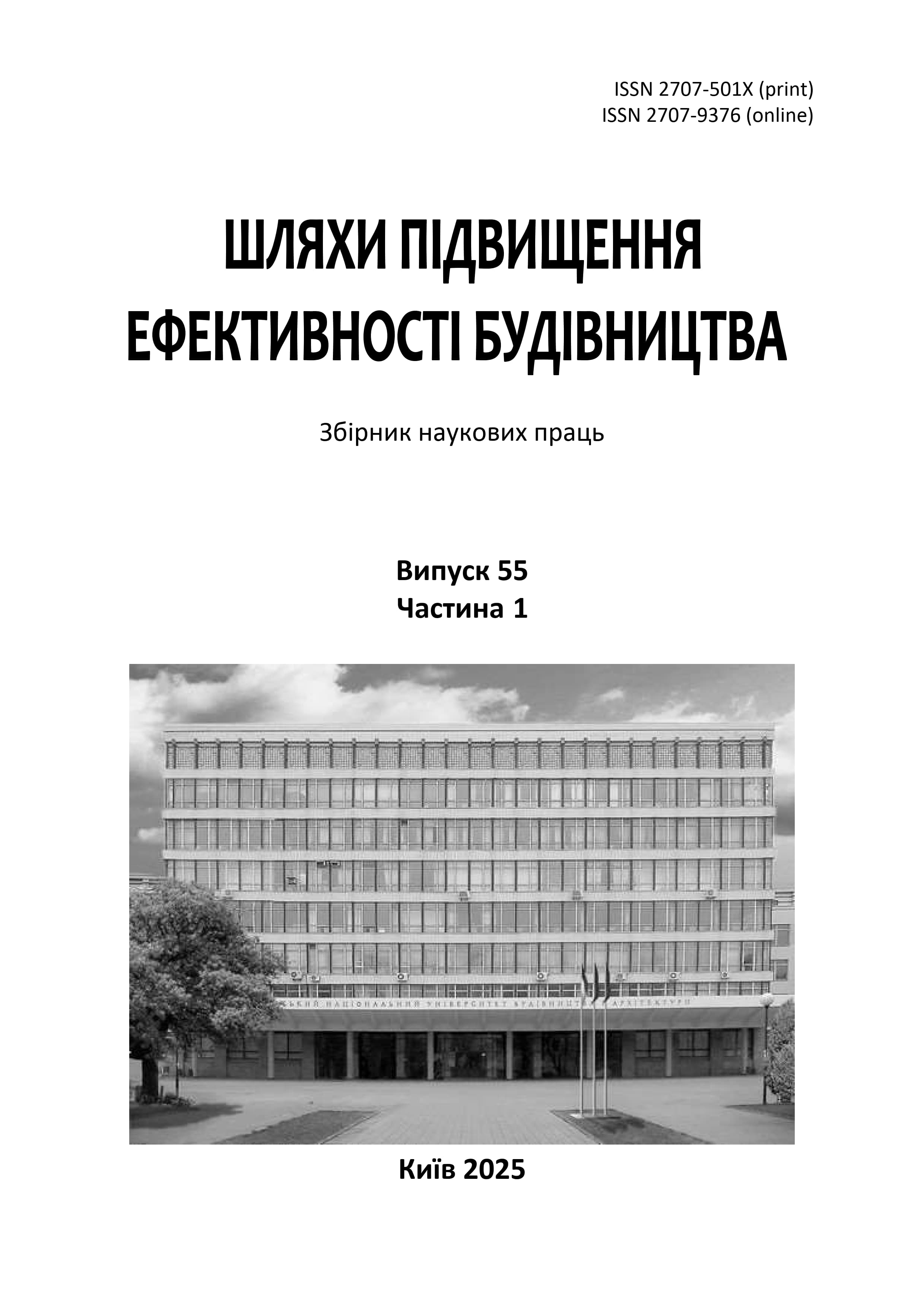Conceptual process-oriented model of reengineering in the construction sector
DOI:
https://doi.org/10.32347/2707-501x.2025.55(1).134-147Keywords:
reengineering, construction sector, business processes, optimization, BPM, BIM, automation, efficiency, management, modernizationAbstract
The conceptual process-oriented model of reengineering in the construction sector is a fundamental approach to transforming business processes in the construction industry to enhance their efficiency, productivity, and competitiveness. It is based on the use of modern process management methodologies, including the identification, analysis, optimization, and implementation of innovative changes in the production and management mechanisms of construction companies. The primary objective of this model is not only to improve individual aspects of activity but also to ensure a holistic approach to managing all components of business processes, including interactions between structural divisions, suppliers, contractors, and clients.
The process-oriented approach to reengineering in the construction sector is founded on principles of radical restructuring of operational and management procedures to achieve significant improvements in cost, quality, execution speed, and adaptability to market changes. The use of Business Process Management (BPM) methodology enables the systematization and automation of processes, reduction of inefficiencies, cost minimization, and an increased level of control over project execution. A key tool for implementing this conceptual model is the use of digital technologies, including Building Information Modeling (BIM), which enhances design accuracy, optimizes costs, and reduces risks. Another important element is the integration of quality management systems, ensuring compliance with regulatory requirements and increasing the reliability of construction output.
The effective implementation of the conceptual process-oriented model of reengineering requires a thorough analysis of the current state of business processes, identification of bottlenecks, and the formation of a strategic vision for change. A crucial component is the adoption of agile management principles, which allow for rapid adaptation to changing market conditions and regulatory requirements. Moreover, implementing such a model necessitates a high level of personnel competence and an organizational culture focused on continuous improvement. The application of reengineering in the construction sector enables increased project execution efficiency, cost reduction, optimization of resource allocation, and improved interaction among all process participants.
Thus, the conceptual process-oriented model of reengineering in the construction sector is a necessary prerequisite for improving project management efficiency, modernizing business processes, and achieving sustainable industry development. It provides construction companies with strategic advantages through the integration of modern technologies, process automation, and adaptation to the dynamic changes of the market environment.
References
Chupryna, Iu., Tormosov, R., Aryn, A., Horbach, M., Prykhodko, D., Polzikov, M. The Updated Tool for Selecting Projects for the Target Programs of Sustainable Energy Development. SIST 2023 - 2023 IEEE International Conference on Smart Information Systems and Technologies, Proceedings, 2023, pp. 457–467. https://ieeexplore.ieee.org/abstract/document/10223492
Аксельрод Р.Б. Науково-методологічні засади управління процесами трансформації будівельних підприємств: дис. … д-ра екон. наук: 08.00.04. Київ, 2022. 437 с.
Аксельрод Р.Б. Трансформація системи менеджменту будівельних підприємств: методологія та науково-прикладний інструментарій:монографія. К.: ПП Сердюк В.Л., 2021. 428 с.
Деркач А.Є. Економіко-цифровий інструментарій впровадження реінжинірингу на будівельному підприємстві: дис. … канд. екон. наук: 051. Київ: КНУБА, 2023. 250 с.
Деркач А. Реінжиніринг бізнес-процесів будівельного підприємства в умовах цифровізації. Шляхи підвищення ефективності будівництва в умовах формування ринкових відносин. 2022. № 50 (2). С. 251-265. DOI: https://doi.org/10.32347/2707-501x.2022.50(2).251-265.
Зайчук С.В. Економіко-управлінський інструментарій формування господарського портфеля підприємства-девелопера в будівництві: дис. … канд. екон. наук: 08.00.04. Київ: КНУБА, 2024. 276 с.
Зайчук С.В., Кучеренко О.І., Приходько Д.О., Федорова Я.Ю. Концептуально-аналітичні особливості атрибуції мультипроєктної діяльності підприємств у середовищі будівельного девелопменту. Управління розвитком складних систем, 2023, (56), 138-146. dx.doi.org10.32347/2412-9933.2023.56.138-146.
Мироненко К.С. Економічне обгрунтування реінжинірингу бізнес-процесів на інноваційно-активних промислових підприємствах: дис. … канд. екон. наук: 08.00.04. Одеса: Одеський національний політехнічний університет, 2016. 271 с.
Мироненко К.С., Букорос Т.В., Аркушенко А.Р. Визначення необхідності стратегічного планування сучасного підприємства за його етапами. Економіка. Фінанси. Право. 2019. № 5(4). С. 23-27.
Олексін С.М. Засади розвитку реінжинірингу бізнес-процесів підприємств оптової торгівлі: дис. … канд. екон. наук: 08.00.04. Львів: Львівський торговельно-економічний університет, 2018. 298 с.
Осипова Є.Л. Процес впровадження реінжинірингу бізнес-процесів на підприємствах водного транспорту. Причорноморські економічні студії. 2016. Вип. 12(2). С. 14-17.
Осипова Є.Л. Кризовий реінжиніринг бізнес-процесів як інструмент ефективного управління підприємствами водного транспорту. Водний транспорт. 2019. Вип. 1. С. 159-165..
Чуприна Х.М., Чуприна Ю.А., Бородавко М.В., Гавріков Д.О. Стратегії реконфігурації бізнес-процесів будівельних підприємств. Управління розвитком складних систем. 2020. № 41. С. 169 – 174.
Downloads
Published
How to Cite
Issue
Section
License

This work is licensed under a Creative Commons Attribution 4.0 International License.
Authors who publish with this journal agree to the following terms:
- Authors retain copyright and grant the journal right of first publication with the work simultaneously licensed under a Creative Commons Attribution License that allows others to share the work with an acknowledgement of the work's authorship and initial publication in this journal.
- Authors are able to enter into separate, additional contractual arrangements for the non-exclusive distribution of the journal's published version of the work (e.g., post it to an institutional repository or publish it in a book), with an acknowledgement of its initial publication in this journal.
- Authors are permitted and encouraged to post their work online (e.g., in institutional repositories or on their website) prior to and during the submission process, as it can lead to productive exchanges, as well as earlier and greater citation of published work (See The Effect of Open Access).

